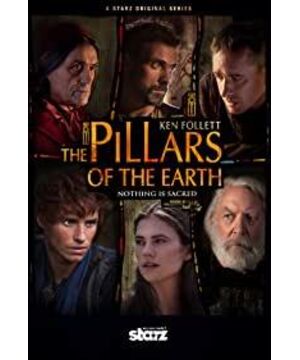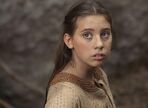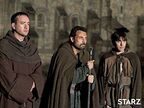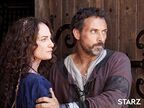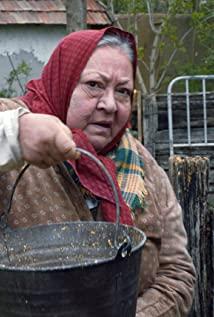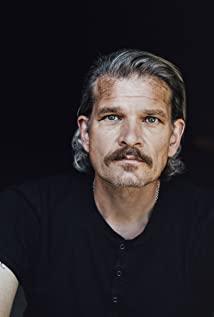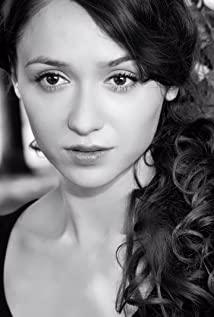On the whole, books and dramas have their own merits, and I personally prefer books. However, I am still very satisfied with the filming of the show, but I am a little unhappy with the handling of the characters. The plot except the ending shows the needs of the plot very well. In 8 episodes, half a century of vicissitudes, the rapidly transformed plot has caught the audience's attention very well. The main storyline has been preserved well. Although there are shortcomings (this will be a later story), it is better in terms of conflict. And intense, this is probably the difference between most TV series and the original book. After all, the main line of the original book is too complicated, and it is not suitable for me to use the camera. Even in the drama, it can clearly feel that there are multiple lines going on. The clues that have been advanced are love, both jack&Aliena and Tom&Ellen; the second is the construction of the cathedral, from tom to alfred to jack, and of course a philip who is firmly behind; the third, the grudge between Bartholomew and hamleigh History; fourth, the exchange of contracts between Philip and Waleran to confrontation; finally, there is the struggle for kingship.
In terms of characters, it seems that the presumed first protagonist in the play is Bishop Waleran, who is established as an absolute opposite, and the ambition to climb up is omnipotent for his own desires. btw, ellen's curse is the final end of the three main antagonists (dean james doesn't really count). But in fact waleran is not a pure bad guy (all the bad guys in the play are like this), he will punish himself with penance that brings into his legs, flogging, and piercing, in order to find a kind of, maybe spiritual Balance and comfort. When he saw the completed Wangqiao Cathedral, he couldn't help but be amazed and amazed. I think his admiration at this time showed that he still believed in miracles in his heart. And in the end, when Jack reached out to him to save his life, he probably thought that no amount of penance would be able to cleanse his sins, so let the fire of hell devour the devil in his heart. The treatment of him in the book is that he gained everything but lost it instantly. Personally, I think this way of living will make him more sad than death, and when the old Wangqiao church caught fire, Waleran was also sincerely saddened. Despite his different positions and vicious methods, waleran is always a priest, and what cannot be overwhelmed is his love for God, but it is this love that drives him to gain greater power, to fight against kingship, to make profits for the church, and for himself profit.
Tom the Builder is the second male protagonist, but I personally think that the character design is nothing good, too simple, whether in the book or in the play, the only extraordinary thing in his life is to abandon Jonathan, and then all kinds of guilt , of course any normal father would. Building a cathedral was his lifelong pursuit and all desire, but he was not a dreamer, he put it into practice. Tom in the book is a partner who can communicate with Philip. The relationship in the play is a little simple, just employer and employee. His love for Ellen is another clue for Tom, and it is also the first part of the biggest clue love in the whole play. This love is very breakthrough in the secular, and it is the collision of religion and non-religion (Jack and Aliena are the collision of class and status). Tom's death is relatively silent. There may be some heroic complex in the play. Tom deliberately went to lead William, thinking that he could repeat the old trick, but unfortunately the sword is ruthless. In fact, the book is also speechless. Tom was stabbed to death by William's sword in the confusion. This is actually more real, because the life and death of small people should be insignificant in the eyes of the powerful. For a craftsman to negotiate terms with an earl-level figure in that era was tantamount to a dream.
Prior Philip is the third character in the play. Personally, I think he should be ahead of Tom because Tom died in the middle. Ken said when he wrote the book that he made Philip a pure good guy, I don't think so (again), but the show made it happen. In the play, Philip's talent is weakened and his faith is magnified. I thought it was designed to highlight the role of people. At the same time, Philip in the show is also a bit more ambitious than in the book, when Philip tells Cuthbert that "a person who is too modest can also get in the way of God's will" instead of Cuthbert in the book telling Philip. In short, Philip in the book is a gradual process, and the show shows Philip's ambition from the beginning. One of my favorite shots is the sunrise when Philip recaptures the quarry. It's so beautiful, the soul-stirring beauty cannot be expressed in words. When it comes to dealing with Ellen, Philip in the play is more knowledgeable. He not only saved Ellen, but also acknowledged her from a personal point of view, but in his position, morality could not convince him, or could not let him Convince the church to accept it. Philip in the book treats Ellen as an enemy to some extent, until the end of Philip's false accusation (not in the play), and the same goes for Aliena's love. Philip in the play has a more worldly flavor. After all, he needs to be loved by the audience, and a monk who stubbornly destroys the beautiful love in the eyes of the audience may not be accepted. Therefore, Philip's role in the play is actually greatly weakened, and many wonderful things in the second half can't be shown. Let's just write Philip alone.
Jack is a special character, the only one who grew up with the cathedral (if you have to say Jonathan is also a part of me). His mother gave Tom love and passion, his stepbrother brought disaster to the cathedral, his lover was transformed, his stepsister became the key to his father's innocence, his father and ex The death of the crown prince is closely related to his mother's position. His stepfather has delivered his lifelong dream. It was his fire that started all the cathedral stories. The description of the psychological details in the book is extremely detailed when describing Jack's arson. Accompanied by sin, a child's mentality is vividly written. I'm sad that the show took arson by the way, but maybe the show needs his unique way of handling it. In addition, Jack’s overseas inglis were almost all cut. The Madonna of Weeping changed from a gift from a Jewish family to a self-made one, which caused a big blow to Jack’s personal image. I don't like it very much. After all, Jack was just a craftsman, and in terms of the social form at the time, it was out of the question that Jack was above Philip.
Then finally a girl came out, Aliena. Pillars is a man's play, but the women in it are all wonderful! Aliena is the former Xialing County Lord. Her rejection of marriage caused the Hamleigh family's crazy counterattack, and the grievances between the two families, two towns, Xialing and Wangqiao. Her life was the most ups and downs, and the most lovable. Her self-confidence, her nobility, her atmosphere, and her talent are not inferior to any man. Because of the oath she made to her father (Richard's oath in the book), she took full responsibility for the family and became the largest wool merchant in Wangqiao, supporting all the expenses of Richard as a knight, but in exchange for her brother after bankruptcy. succumbed to it and was forced to marry Alfred. Of course, it had something to do with her snubbing Jack for being insulted by William, but if it wasn't for Richard, she wouldn't have married. Such a proud woman, apart from oath, what else can she be like this? In the book, when Aliena saw that she had to humble herself to please her husband after marriage, she felt sad to death. A woman, depending on how strong you are, what can you do? Fortunately, children Tommy and Ellen gave Aliena hope of rebirth. After more than 7 months, Aliena finally found jack. Although there are still difficulties and obstacles in front of her, there is nothing that can make the two love each other so much. People are separated.
The purest villain in William Hamleigh's books is less ticklish in the show. I joked that Pillars made the good guys pale and the bad guys three-dimensional. Yes, I do think so. William's badness is written for no reason in the book. It is a natural badness brought about by his character. In the play, all his badness is caused by the emotional entanglement of two women, seducing his mother and rejecting him. his Aliena. It may be superficial to say this, but William is such a brainless and mean-spirited man, very similar to his father Percy. The Hamleighs are obviously reckless men, and Regan is basically the only one who can deal with Waleran. Different from the book, William's badness in the play basically has nothing to do with Richard, and it is mostly a distorted environment and greed stimulated by desire. As for William's pleasure by abusing women, the play was changed to a side profile. The poor little Elizabeth's brutality contrasted vividly. This should also be the need for performance. After all, what William and Watt did was disgusting.
Ellen is one of my favorite characters in the entire book and show. She dares to love and hate, her personality is flamboyant, and she blows into every corner of the theocratic society with a natural taste and wild uninhibitedness like a fresh wind. She is the extreme of secular culture, defying all etiquette and restraint. But beneath her slutty exterior is a fiery, kind heart. She was said to be a calf lioness in the book, and that was it. She has no ill will towards anyone (and the people who hurt her husband, just asking for an explanation, so she doesn't want Jack to take revenge), saves Matha, takes care of her grandson Tommy, and does everything she can to help Aliena whether she is her own daughter-in-law or not. Her diligence and ability are by no means inferior to Aliena, but she is willing to help Aliena to weave wool and sell it to monks (not in the play). Although she has always been out of tune with the monks, and even resented Philip for separating her from Tom, including the ten-year separation between Aliena and Jack, she still testified for Philip to return his innocence. This is not a reconciliation, it's just that in her heart, like Philip, she won't wrong a good person, although she can't complain with virtue like Philip. Ellen's beauty is such a wild punch that I really don't like it.
Regan Hamleigh is a horny one. Since the initial sinking of the White Ship, she has been missing in every bad thing. She is the true backbone of the Hamleigh family. This woman's methods are too fancy, her brain is too active, her ambition is too arrogant, and she is not at a disadvantage in the confrontation with Waleran. Even I don't think Waleran is necessarily a match for her. For the son's title, he can kill his husband with his own hands, and for the shirling's revival, he can give his father's heirloom ring. She is bad but also bad and straightforward. In the play, she was arranged to have an incestuous relationship with William. After her disappointment with her incompetent husband Percy, her son became the whole and only sustenance of her life and spirit. And it was her step-by-step temptation and persecution that finally brought her own calamity. Because she doesn't know how to respect, she has never respected. She compliments and takes advantage of people who are more powerful than her. She wants to hurt and trample on people who are inferior to her. Even for her relatives, she plays with other people's lives like puppets. No one can stand it because of such a source of oppression. It is no wonder that William will personally end the life of the only mother who can help him in fear and resentment. Having a mother like this for more than 20 years, how can you make William not twisted, perverted, and cowardly?
Unlike Regan, Alfred's bad is too narrow. He hates Jack and Ellen for taking his father, so he desperately takes pleasure in hitting Jack, whether it's smashing Jack's statue in the show or insulting and provoking Jack's biological father in the book. She took pleasure in the pain of Jack and Ellen, too sad, too cold-blooded. The book also writes that when Alfred's roof collapsed and he had no work to do, Jack gave him a job, but in a blink of an eye he betrayed Wang Qiao and took the craftsman to work in the Xia Mausoleum. In addition, in the book, Alfred married Aliena entirely for venting and ambition Jack, without sincerity and love. Compared to the show, it is more tender. Alfred has saved Aliena's life, and he also has feelings. He really loves Aliena. Maybe the screenwriter thinks the triangle looks better. But back to the beginning, was Alfred wrong? I have no idea. Who can bear your dad make love with another woman quite the time just after your mom dead. at the place your mom sleep forever? One second he was still crying for his beloved wife, and the next time he bought it, he invested in another woman's tender land, although it contained some kind of venting flavor, because there were too many unspeakable anger, sorrow, and pain. He regrets, just simply looking for an exit. But, from Alfred's point of view, who wouldn't hate it?
The main characters are basically here. The rest of Richard, the down-and-out knight in the play, the bloodthirsty man in the book who can't do anything except fight, is not as good as his sister at all. Matha, loves Jack but can only look at Jack and Aliena's happy, quiet and kind sister. Bartholomew, tolerant father, righteous earl. King Stephen, Queen Maud, King Herry 1&2, all kings have one virtue. Remigius, the poor monk at the mercy of Waleran, finally repented. Percy, a straw bag. Johnny Eightpence, the charitable dad. Cuthberd, Philip's most loyal supporter. Francis, a brilliant politician with a brain as bright as Philip.
Speaking of actors. Matthew Macfadyen (Philip) doesn't write anything, I'm totally subjective, it's for him. The moment when he led the monks to retake the quarry was over. That kind of firm belief, devout belief (actually, it was his own cleverness to bluff people), persistent eyes, deep voice, smooth forehead, bathed in the morning light, and every move revealed a kind of holiness. , absolutely crazy.
Ian McShane (Waleran), worthy of being a boss, his movements and demeanor are almost without exception just right, and the grasp of small details is very skillful. It seems that there are no major emotional fluctuations, but in fact, the feeling of surging waves in the background is vividly expressed. The aura is so powerful that both the emperor and the queen are compared. It seems that the monarch is a swollen face and a fat man, but he is a deep and scheming man who is desperate and a real decision maker.
Donald Sutherland (Bartholomew), the biggest name in the bar. 05Mr.Bennet of "Pride and Prejudice", "Bethune", "The Big Shot", "The Day and the Day", "The Big River"... The old man's skills are not covered, and he happens to be Canadian (this film is produced by CBC), no wonder He put it on the poster, and it was written that he was the second in the cast after Ian, but it was a pity that the role was a little less.
Hayley Atwell (Aliena), a new generation in the UK, it is rare to be able to express such a huge gap as Aliena without being abrupt. I just think she is not beautiful enough. Maybe the aesthetics of foreigners are different from ours?
Rufus Sewell (Tom), no sense. Didn't feel good. On the contrary, Liam Garrigan's Alfred played the most brilliant role in Tom's family. That arrogance, arrogance, deep hatred and final decadence, depravity, is impressive. Especially when he was dying in shock and stunned and beat Aliena, I couldn't help but feel that Alfred was actually not that hateful. And Eddie Redmayne's Jack made me less satisfied. The psychological changes in the burning of the church may have been completely played out because of the script, but then the feeling of incomprehension always filled my eyes. When I saw Aliena in a foreign land, I didn't see how excited he was. In short, there is something missing in his eyes, there is no obsession with church like Tom's, which makes people feel dull. And I don't like his voice, maybe I can't appreciate such a handsome guy.
William of David Oakes, unquestionably handsome. Lengtouqing's feeling is well acted, and it also has an arrogant taste. Sarah Parish's Regan is great. Her mistress and Merlin are also very good, especially the feeling of seducing her son, like a witch who has cast spells, very tasteful and evil. Natalia Worner (Ellen), basically satisfied, the facial expressions are not rich enough, but very charming, very Ellen's style, that kind of jealousy feels good. BTW, little Jonathan is cute and adorable.
All in all, a very good drama without reading the book. The ups and downs are entangled, multi-line but not chaotic, around the theme of the cathedral, the plot is compact and not procrastination, there is a sense of proportion, the historical details of ancient costumes are in place, and I especially like the production of the title. Although it is not produced by the BBC, it is also a high-quality product.
But after comparing it with the book, some of the plots are not so satisfactory. For example, Archbishop Tomas was completely ignored, and he failed to fully show Philip’s talents. What a huge project to lead the monks to petition and march in England. This scene is very important for Philip’s image building. It’s a pity to cut it off. . Most of the rest are for the coherence and rhythm of the series, basically obliterating Jack's overseas experience, and the presentation of history cannot be restored to the novel. The confrontation between kingship and theocracy was downplayed, the rise of the handicraft industry (that is, the specific business content of Aliena) was ignored, the omens of the enclosure movement could not be written because of the absence of the parish church, the development of towns was strode over, and wars The process of being merged and blurred, the church architecture art of Spain and France cannot be displayed at all, What a pity! But in fact, these things can not be fully expressed through drama. Novels and TV series are two different artistic expression methods, with different focus and different narrative methods. Fortunately, Pillars shows us the widest possible range of medieval England. The tone of the book is dark, but the play is bright and flamboyant, more human, more exciting, and more imposing than the trivialness of the book. It's a good drama worth watching and watching again.
About Philip:
I insist that all beings, after being repressed (inevitably) by the world or life, must find an outlet to vent. Philip was repressed by his status as a monk, especially for women, so his life, no matter what the means, was for Wangqiao and for the benefit of the parishioners. Purification is to purify the soul, the monastery is organized for financial needs, the dogma is strict to convince people, the market is opened for the life of the residents, even the most selfish parts of him, such as his love for Jack and his love for Jonathan (drama). (not specified in the text) was cultivated simply because he liked these two children and felt that they could take his class well, complete the priesthood, and perform God’s mission. Admittedly, his methods are not noble, at least compared to Archbishop Tomas, he is too tacky. After the baptism of war, he became more firm in his belief that even God is not omnipotent. He was able to survive to the end in the war-torn era without losing his life, not because he was a monk or a vice president, but only because he had the wisdom of life. He is honest but not reckless, he knows how to do things. He is not good at preaching, but he can give the best solution in difficult situations. He has a cultivator who shouldn't be resourceful and shrewd, even the thick black school is not bad. But the important thing is that the most determined place in his heart is to be kind. Whether William, the Craftsman, Waleran, King or Queen, all obstructions could not change his first and last dream. He would trade with Waleran for his dreams, he would turn his back on Richard, he would blame Jack and Tom, and he would quarrel with Ellen over his beliefs, but everyone knew that he was irreproachable, no matter the method, because There is no one whose motives are purer than Philip, and there is no one who is more impeccable than Philip. Yes, it's hard for you to knock him out. No desire is just. Even if he will be disappointed and lost by the power of religion, and will doubt whether the evil is inherently greater than the good, but he always, to the best of his ability, does his duty to protect everything she can reach, people. ,thing. He has the purest distinction between good and evil, so his decisions never seem to be made without a second thought. He is willing to be a tolerant hand in the depths of the enemy's distress, willing to stop the robber's hunger and satiety, and his dealings are only to protect the people under his rule and to survive in the chaotic world, and he points them to the bright Road and lead practice, never slack. However, in fact, Philip is also lucky enough, maybe God sees his goodness, so he has a brother like Francis , able to guide him in the political situation. I dare say that if Philip was in politics, he would be no worse than any politician. But Philip was reluctant, because he was presenting for the cause of God, much nobler and more beneficial than those swinging politicians. He is older than the church, and the natural church will take root and sprout from the seeds of kindness irrigated in his childhood. His study, his experience, made him mature. Mature means not cute, he is not magnanimous, but upright. What he left at the end is still intoxicating and moved by everyone, just like the scene of him facing the rising sun, condensed into a kind of beauty of faith.
View more about The Pillars of the Earth reviews


